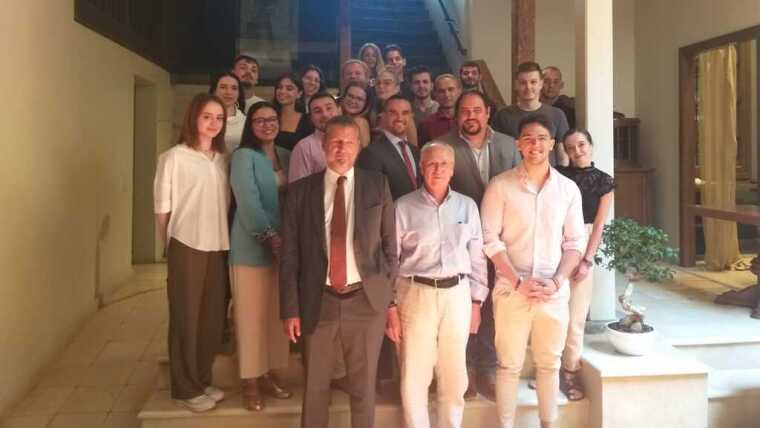
- Publications
Published: | By: Kavala International Summer School, Thessaloniki 14-19 July 2025
The 4th Kavala International Summer School for Diplomacy and International Relations, convened in the city of Thessaloniki from July 14 to 19, 2025, brought together scholars, diplomats, experts and students from across the world to explore the interrelated challenges of climate change, energy security, and multicultural coexistence through the lens of conflict resolution and international cooperation. With the school focusing on the Eastern Mediterranean and Asia as regions of interest, as they have always been a region of conflict and volatility, attracting the attention of the international community with their complex geopolitical dynamics, historical tensions, and competing energy interests.
The forum, jointly organized by distinguished academic institutions including Jena Center for Reconciliation Studies (JCRS) at Friedrich Schiller University Jena, the American College of Thessaloniki (ACT), and the Institute of Foreign Affairs in Athens, facilitated an environment of discussion and exchange of ideas through their workshops, lectures, and case studies. Participants explored a wide array of interconnected issues, highlighting the urgent need for comprehensive, cooperative strategies in addressing global and regional challenges, such as:
- Energy diplomacy and infrastructure projects, like the Great Sea Interconnector between Greece and Israel, were discussed as both opportunities for regional cooperation and potential sources of geopolitical tension. The evolving energy landscape in the Eastern Mediterranean—encompassing pipelines, maritime routes, and electricity cables—underscores the necessity of inclusive energy frameworks grounded in international law and mutual benefit.
- Climate-related disputes over transboundary water resources, exemplified by the River Arda between Greece and Bulgaria and the Grand Ethiopian Renaissance Dam (GERD) between Ethiopia and Egypt, revealed how environmental stressors are intensifying existing rivalries. These cases emphasized the importance of hydrodiplomacy, equitable resource sharing, and regional institutions capable of mitigating climate-induced conflicts.
- The historical context of violent conflict in the Middle East was examined to understand the long-standing roots of instability, including foreign intervention, separatism and unresolved national grievances. This historical lens provided essential insight for crafting modern reconciliation strategies.
- Geopolitical tensions over maritime boundaries, such as the disputes between Libya and Greece and Turkey’s “Mavi Vatan” doctrine, illustrated the delicate intersection between national sovereignty, energy exploration, and international maritime law, focusing on the need to examine the national interest of individual international entities prior to seeking a cooperative effort in resolving such conflicts, aiming for a “win-win” resolution. Dialogue, legal clarity, and de-escalation were identified as critical tools for regional stability.
- Multiculturalism and migration, particularly Greece’s efforts to integrate refugees and migrants, emerged as central themes in addressing social cohesion and inclusive governance. Participants highlighted that migration is increasingly driven by environmental degradation and conflict, necessitating forward-thinking policy rooted in both humanitarian and security frameworks, emphasizing on elements like language, education, employment, adaptive policy making, and social awareness, as vital for the strengthening of the democratic institutions, promotion of social cohesion, economic development, and improvement among the lives of immigrants.
- Reconciliation models, such as the Franco-German rapprochement of the 1960s, served as powerful example of how former adversaries can build lasting peace through diplomacy, institutional cooperation, and cultural dialogue. These lessons hold valuable relevance for regions currently seeking pathways to overcome division and hostility.
The Kavala Declaration thus calls upon governments, civil society, academic institutions, and international organizations to:
- Support regional and transboundary cooperation on climate and energy issues through diplomacy and inclusive policy-making.
- Promote legal and institutional frameworks for the peaceful resolution of maritime and resource-related disputes.
- Recognize the role of history, memory, and identity in conflict, and to invest in reconciliation mechanisms grounded in education and dialogue.
- Advance multicultural coexistence by fostering policies that integrate migrants and minority communities in ways that respect diversity and social cohesion.
- Strengthen international networks of scholars, students, and practitioners committed to peacebuilding, sustainable development, and global cooperation.
Throughout the week, participants reaffirmed the importance of fostering dialogue, promoting education, and supporting multilateral institutions as essential components of peaceful international relations. They emphasized that lasting solutions to climate, energy, and multicultural challenges must be rooted in shared responsibility, historical understanding, and a commitment to equity and sustainability.